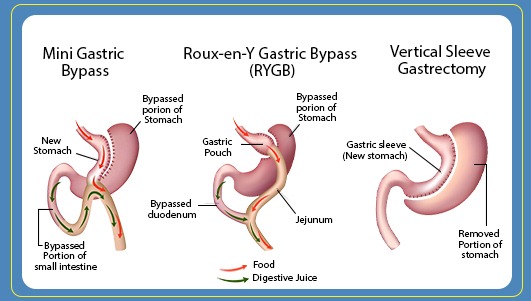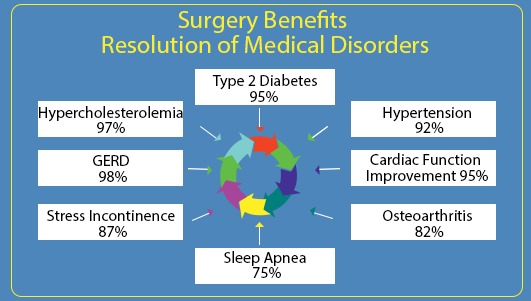OBESITY

What is Obesity?
Does it matter if am Obese?
Does it affect my quality of life?
What is Bariatric Surgery?
What are the Benefits of Bariatric Surgery?
What is Obesity?
The World Health Organization (W.H.O.), along with National and International medical and scientific societies recognize obesity as a chronic progressive disease resulting from multiple environmental and genetic factors. It is no longer a cosmetic issue that is caused by overeating and a lack of self-control. Due to its progressive nature, obesity requires life-long treatment and control.

Does it matter if am Obese?
Obesity basically means that you have too much fat and that can cause a lot of damage to your body. People with severe obesity are more likely to have other diseases like:
- High triglycerides and low high-density lipoprotein (HDL) cholesterol
- Type 2 diabetes
- High blood pressure
- Metabolic syndrome – a combination of high blood sugar, high blood pressure, high triglycerides, and low HDL cholesterol
- Heart disease
- Stroke
- Cancer
- Breathing disorders, including sleep apnea, a potentially serious sleep disorder in which breathing repeatedly stops and starts
- Gallbladder disease
- Gynecological problems, such as infertility and irregular periods
- Erectile dysfunction and sexual health issues
- Nonalcoholic fatty liver disease, a condition in which fat builds up in the liver and can cause inflammation or scarring
- Osteoarthritis
According to the American Obesity Association, obesity poses an increased risk of death by 50-100% when compared to normal weight, with 300,000 to 587,000 annual deaths.
Does it affect my quality of life?
Yes once your Body Mass Index (BMI) increases; weight-related issues may affect your quality of life that includes:
- Depression
- Disability
- Sexual problems
- Shame and guilt
- Social isolation
- Lower work achievement
What is Body Mass Index (BMI)?
The body mass index (BMI) is a common measure used to define overweight and obesity. BMI takes into consideration an individual’s height and weight and can be determined by using a BMI chart or can be calculated according to a simple formula.
Category | BMI | Health Risk |
Normal | 18.5 – 24.9 | Minimal |
Overweight | 25 – 29.9 | Increased |
Obese | 30 – 34.9 | High |
Severely Obese | 35 – 39.9 | Very High |
Morbid Obese | 40+ | Extremely High |
.
.
What are the options to Cure Obesity?
Diet, Exercise, and Behavior modifications are an integral parts of treatment of obesity. Good news is that even modest weight loss can improve or prevent the health problems associated with obesity. However; once obesity becomes severe there is high likelihood of failure with conventional measures. The NIH (National Institute of Health) recognizes bariatric (weight-loss) surgery as the only effective treatment to combat severe obesity and maintain weight loss in the long term.
Common indications of Bariatric (Weight Loss) Surgery
Qualification for Bariatric surgery in India majorly include:
1. BMI ≥ 37.5 or more than 100 pounds overweight
2. BMI ≥ 32.5 and at least one or more obesity-related co-morbidities such as type II diabetes (T2DM), hypertension, sleep apnea and other respiratory disorders, non-alcoholic fatty liver disease, osteoarthritis, lipid abnormalities, gastrointestinal disorders, or heart disease.
3. Inability to achieve a healthy weight loss sustained for a period of time with prior weight loss efforts.
Is Weight Loss (Bariatric) Surgery same as Liposuction?
No weight loss surgery is not like liposuction. It does not remove fat from some parts of the body for temporary inch loss but actually resize your stomach by a minimally invasive technique. This gives weight loss that is substantial and sustained over a long period of time.
What is Bariatric Surgery?
Bariatric surgery means procedures that cause weight loss by restricting the amount of food the stomach can hold, causing malabsorption of nutrients, or by a combination of both gastric restriction and malabsorption. Bariatric procedures also cause desirable hormonal changes for effective health benefits.
Most weight loss surgeries today are performed using minimally invasive techniques (laparoscopic surgery) and patient can walk soon after surgery. The hospital stay is usually 2-3 days.
Commonly performed procedures popular today are Laparoscopic Sleeve Gastrectomy and Gastric Bypass Surgery and can be performed with minimal invasive keyhole surgery.
Common Procedures

What are the Benefits of Bariatric Surgery?
The benefits of bariatric surgery go beyond just losing weight:
Long-Term Weight Loss Success
Studies well demonstrate that more than 90 percent of individuals previously affected by severe obesity are successful in maintaining 50 percent or more of their excess weight loss following bariatric surgery.
Improved Longevity
Several large population studies find that individuals affected by severe obesity who have had bariatric surgery have a lower risk of death than individuals affected by obesity who do not have surgery. One of these studies found up to an 89 percent greater reduction in mortality throughout a 5-year observation period for individuals who had bariatric surgery when compared to those who did not. Another large population study comparing mortality rates of bariatric and non-bariatric patients found a greater than 90 percent reduction in death associated with diabetes and a greater than 50 percent reduction in death from heart disease.
Risks of Surgery far exceed the Benefits
The mortality rate for bariatric surgery (3 out of 1000) is similar to that of a gallbladder removal and considerably less than that of a hip replacement. The exceptionally low mortality rate with bariatric surgery is quite remarkable considering that most patients affected by severe obesity are in poor health and have one or more life-threatening diseases at the time of their surgery.
Improvement/Resolution of Coexisting Diseases
The exceptionally high reduction in mortality rates with bariatric surgery are due to the highly significant improvement in those diseases that are caused or worsened by obesity. Today, Bariatric is seen as the only potential cure in Diabetic obese.
Changes in Quality of Life and Psychological Status with Surgery
In addition to improvements in health and longevity, surgical weight loss improves overall quality of life such as mobility, self-esteem, work, social interactions, and sexual function. Singlehood is significantly reduced, as is unemployment and disability. Furthermore, depression and anxiety are significantly reduced following bariatric surgery.



